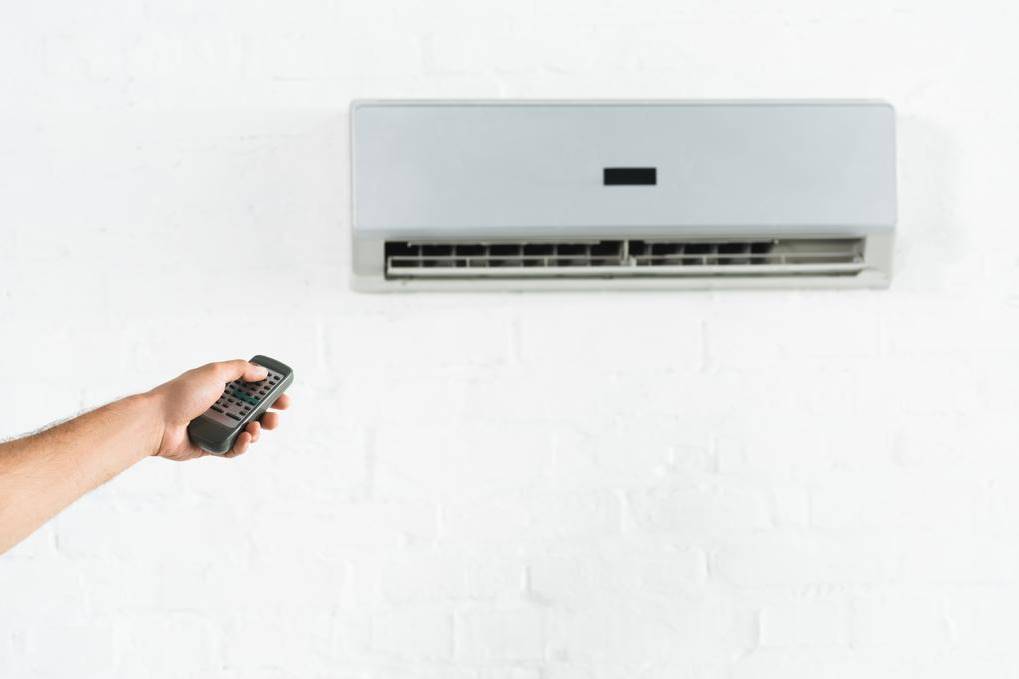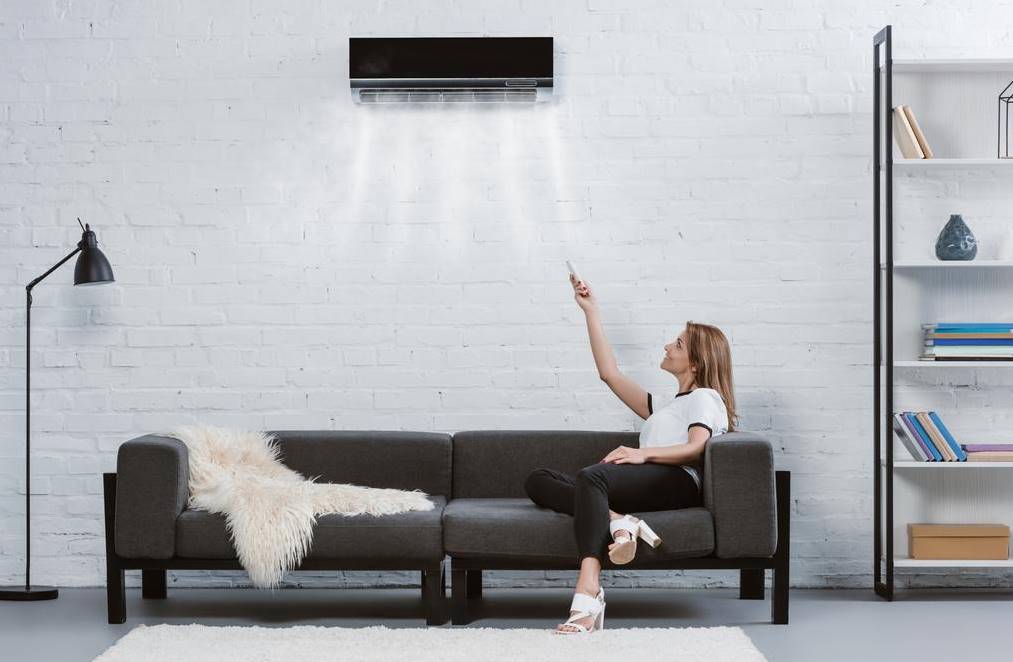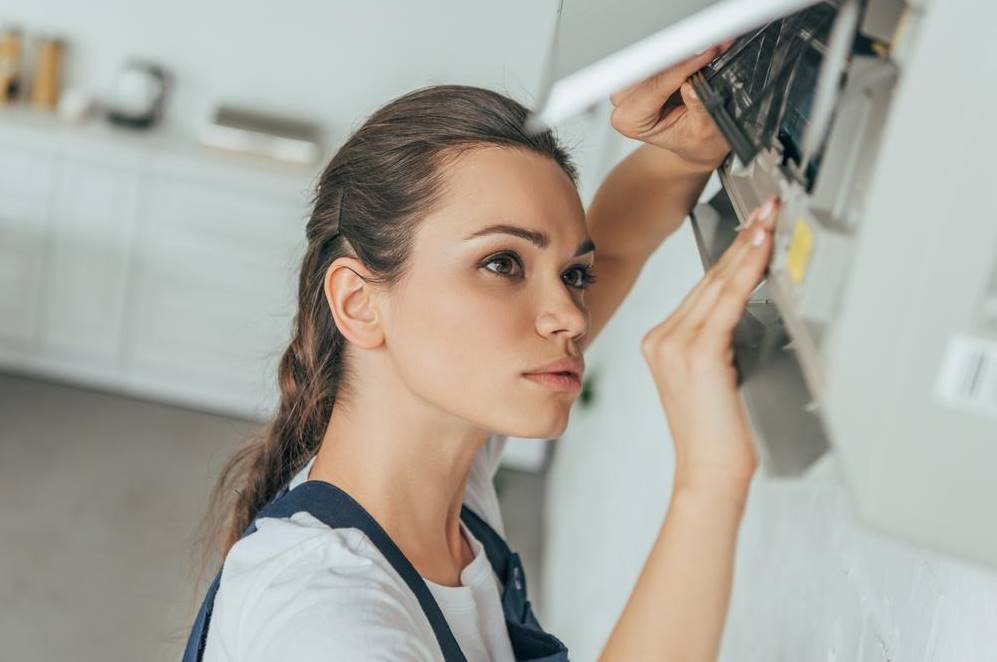What saves us from summer's sweltering heat and monsoon's oppressive humidity? It's our dependable air conditioner! But have you ever wondered how these cutting-edge inventions perform their miracles while reducing your monthly electricity costs? Step into the future of air conditioning with inverter domestic air conditioning systems. In this piece, we'll look at how these systems benefit the public and explain why they're a good investment overall.
What Are Inverter Domestic Air Conditioning Systems?
There are a few different names for what is essentially the same thing: an inverter air conditioner. Employs inverter technology to regulate the speed of the compressor motor, hence modifying the system's cooling and heating capabilities.
How Do Inverter Air Conditioners Operate?
Inverter air conditioners get to the set temperature quickly and efficiently because they kick into high gear immediately. Once the desired temperature is obtained, the process is tweaked repeatedly to keep the environment constant.
An inverter is utilised to modulate the compressor motor speed for precise temperature control continually. Drives convert incoming alternating current to direct current. Then, an electrical inverter uses modulation to generate the required frequency current. An internal microcontroller continuously takes readings of the surrounding air temperature.
How To Tell The Difference Between A Conventional And Inverter Air Conditioner
Let's draw some parallels to get a handle on the idea. Unlike light switches, conventional air conditioners can only be fully on or off. However, inverter air conditioners function more like dimmer switches, changing the cooling intensity as necessary. The energy savings from this type of continual regulation are substantial.
Inverter-type air conditioners continuously modulate the compressor's speed to maintain a desired temperature, as opposed to the on-and-off cycling of classic air conditioners with fixed-speed compressors.
A central air conditioner with an inverter stays on, but its cooling capability varies from high to low to achieve the set temperature while conserving electricity.
We've relied on conventional air conditioners for many years. However, cutting-edge air conditioning has been upgraded using inverter technology for homes. These units employ a compressor with a variable speed to keep the inside at a constant temperature. Conventional air conditioners consume more power by cycling on and off to maintain temperature.
Ac Inverter Systems Have Many Advantages.
Inverter air conditioners have been at the cutting edge of technology for a long time now. Prepare to enter a world of cooling options that are at once effective, silent, and environmentally friendly.
Saving Money Through Efficient Energy Use
Inverter air conditioners' energy efficiency is a major benefit. Traditional air conditioners waste up to 30 per cent of their energy since they cycle on and off frequently to maintain a constant temperature. Due to this, you'll see a significant decrease in your monthly electricity costs.
How Exactly Can Inverter Air Conditioners Reduce Overall Energy Consumption?
There's no denying that an inverter air conditioner saves more money on utility bills than its conventional counterpart. Reduced electricity use and increased efficiency result from the inverter's temperature-sensitive power regulation.
Inverter air conditioners use 40% less energy than conventional ACs. The result is lower monthly energy costs. Despite the higher initial cost, inverter air conditioners quickly pay for themselves in energy savings.
Peaceful And Quiet Operation
Have air conditioners ever irritated you with their constant humming? Since inverter air conditioners don't make as much noise as conventional ones, you may relax in comfort and silence. The inverter air conditioner operates more slowly than a conventional AC. The compressor produces minimal noise. As a result, it makes hardly any noise while it's operating inside. Its noiseless operation ensures a restful night's sleep.
Running slower with low demand decreases noise from the variable speed compressor. As a result, the cooling or heating process is less noisy, making for a more relaxing and agreeable experience in the home or office.
Optimal Temperature Regulation For Better Relaxation
With inverter air conditioners, you can precisely regulate the temperature in your home. These systems easily adjust to your prefered temperature, so you never have to worry about being uncomfortable again.
A quiet, vibration-free operation is typical of an inverter air conditioner. This is good news if you like sleeping with the air conditioner in the bedroom.
A noisy air conditioner that cycles on and off all night is not conducive to a good night's sleep. Relax, knowing the inverter will maintain the thermostat setting all night.
Increased Longevity
Investing in an Inverter AC provides numerous long-term benefits. These systems have a far longer lifespan than conventional air conditioners, so you can rest easy knowing your cooling solution will endure for many years and save you money.
The longevity advantage inverter air conditioners enjoy over their conventional counterparts can be easily explained.
The use of an inverter unit greatly reduces both noise and vibration. A longer period will pass before the machine shows any signs of wear because it functions properly and is not continuously powered on and off.
Effective And Rapid Cooling
Inverter air conditioners cool quickly, reaching the set temperature significantly faster than standard air conditioners. This implies that you won't have to endure the heat for long.
Nothing beats an inverter air conditioner on a hot day when you get home and immediately want to chill off.
A non-inverter unit cannot have its cooling output varied. You can only adjust it to the temperature you want. However, with an inverter system, the compressor can be operated at a higher speed, resulting in a more rapid space cooling. This provides rapid relief from the sweltering summer heat.
Eco-Friendly And Low-Maintenance
Less care is needed for inverter air conditioners. There are fewer moving components and less waste in the cooling system, so it needs less upkeep. Inverter air conditioners use less electricity. Therefore, they produce fewer glasshouse gas emissions. A home's environmental effect could be reduced by using an inverter air conditioner.
Are you concerned about leaving as little of a carbon footprint as possible? Because of their lower energy consumption, inverter air conditioners are preferable for the planet. By using these methods, you'll be laying the groundwork for a brighter, greener tomorrow.
This is one of an inverter air conditioner's most notable and useful features. The inverter unit's lower energy usage results in fewer glasshouse gas emissions. This is because maintaining peak efficiency over the compressor's life is essential.
A one-to-one relationship exists between an inverter's energy efficiency, profitability, and the environment's health. Therefore, inverter technology is the most eco-friendly choice, and it performs even better when powered by solar energy.
Flexible Setup Procedures
Inverter air conditioners can be wall, ceiling, or floor-mounted for convenience. They are highly flexible and may modify their appearance to fit any environment. The significant savings in electricity bills compensate for its high price, one of the less well-known but equally important benefits of inverter air conditioners. Other benefits of inverter air conditioners include the ability to run on solar panels, a nature that is friendly to the environment due to the use of high-quality refrigerants, and their high price, which is covered by their ability to run on solar panels.
The Disadvantages Of Inverter Ac Systems
While inverter AC systems have many advantages, there are also some drawbacks. The following are some of the drawbacks of using an inverter AC:
Costly Purchase
The use of inverter AC is novel. New technology is being used, too. There is not much interest in these AC units at the moment. To top it all off, it's pricey due to the high cost of its parts. Budget-conscious households should not consider inverter air conditioners.
Overheating Due To Poor Insulation
When the space is well insulated, an inverter air conditioner saves energy. If the room's insulation is subpar, you might expect excessive power usage and a high electricity cost.
Due to their more complex design and higher-end components, inverter air conditioners are more expensive upfront. The money saved on energy bills over time could eventually pay for itself.
High Cost Of Maintenance And Fixes
It takes pricey parts to assemble an AC inverter. This makes upkeep and repairs an expensive service. Before purchasing, you should calculate how much it would hurt your wallet if something went wrong.
The Danger Of Power Surges
Power surges and changes in voltage can cause more damage to an inverter AC. Sudden power spikes or decreases can damage inverter circuitry and other electronics, requiring costly repairs or replacements.
Increase Humidity
If the inverter air conditioner is too strong for the space, it will cycle on and off frequently to keep the room at a set temperature. With sufficient dehumidification, the room temperature will stay the same. When this occurs, the desired temperature is reached, but the room's relative humidity remains elevated, making occupants uneasy.
Problems With Compatibility
Inverter air conditioners won't work with your home's current wiring. To function properly, they need constant and dependable power sources. To use an inverter air conditioner, you may need to replace or change your existing electrical infrastructure if it is old or unstable.
Weight And Size
Inverter air conditioners are often larger and heavier than standard air conditioners because they contain more circuitry and electronics. This can be problematic during installation and transit, especially in tight quarters or with restricted access.
Despite these drawbacks, inverter air conditioners are widely used because of their low operating costs, high efficiency, and fine-tuned temperature regulation.
Should I Invest In An Inverter Air Conditioner?
The maintenance and repair cost for an inverter air conditioner is relatively significant. It's too much of a premium over the cost of a regular air conditioner.
Lower monthly energy costs offset this difference if you view the investment over the long term. It typically takes two years for one type of air conditioner to equal the cost of the other. The real question is whether you can afford an expensive purchase today that will pay for itself within two years. If the response to both questions is "Yes," the transaction can be finalised. However, if you respond "no," a standard air conditioner will do just fine.
The inverter AC's benefits and drawbacks complicate the decision-making process. Maintenance costs are also prohibitive, which works against it. However, it cannot be denied that they are the most effective in every other respect. Inverter air conditioners are impossible to overlook when considering energy usage, power bills, and operational efficiency. Only time will tell how well-received they are by the populace.
We advise learning about air conditioning and considering inverter air conditioners until then.
Regarding home air conditioning, inverter systems have changed the game. They run quietly, allow for fine-tuned temperature regulation, and last longer than conventional alternatives. In addition to being fast at cooling and helping the environment, they also require little in the way of upkeep. An Inverter AC is the best option if you're shopping for a cooling system because it satisfies your needs and budget.
That sums up the benefits of inverter home air conditioning systems. Keep cool and comfy without breaking the money or harming the environment with these air conditioners. Invest in an Inverter air conditioner to keep cool while reducing your carbon footprint.
Conclusion
Home inverter air conditioners control compressor motor speed and cooling and heating capacity with inverter technology. These fast, efficient technologies alter the temperature maintenance process. Like dimmer switches, inverter air conditioners can alter cooling power. They reduce the demand for conventional air conditioners, which waste up to 30% of energy due to their endless cycle. Inverter air conditioners consume 40% less energy than typical ACs, lowering monthly expenditures. The electricity savings from inverter air conditioners offsets their higher cost. An inverter air conditioner can reduce energy costs and environmental effect.
Inverter air conditioners are quieter, cooler, more durable, energy efficient, and easier to install. They run quietly and slowly, allowing for decent sleep. These silent, vibration-free devices can be set to your desired temperature. Inverter air conditioners last longer due to lesser noise and vibration. They cool faster than conventional air conditioners and provide instant relief from the heat. Inverter air conditioners minimise glasshouse gas emissions and electrical use, making them low-maintenance. They are the greenest when powered by solar energy. The large upfront cost of inverter air conditioners is more than covered by the monthly electricity savings. Solar-powered, eco-friendly, and with high-quality refrigerants.
Cost-effectiveness, efficiency, and precise temperature control are benefits of inverter AC systems. These technologies also have drawbacks such high upfront and recurring costs, increased humidity, power fluctuations, interoperability issues, and mass and weight.
Due to their complex technology and intricate design, inverter air conditioners are too expensive for many homes. Poor insulation and a complicated design cause overheating and high operating costs. Power surges can damage inverter circuitry and electronics, requiring costly repairs or replacements.
Additionally, inverter ACs are heavier and bulkier than regular ACs, making installation and shipping difficult. reduced monthly energy costs more than compensate for the reduced ROI.
Inverter AC systems offer reduced noise, accurate temperature control, and long-term reliability. Looking for an affordable, eco-friendly cooling system? Look no further.
Content Summary
- Inverter home air conditioning systems control the speed of the compressor motor to optimise cooling and heating performance.
- Air conditioners with inverter technology can quickly reach the desired temperature and keep it constant with their constant adjusting.
- Modulation is used for both the AC-to-DC and compressor-frequency conversions.
- Like dimmer switches, inverter air conditioners reduce energy use.
- Standard air conditioners have compressors that run at constant speed and cycle on and off.
- A constant level of cooling is provided by inverter air conditioners.
- When compared to conventional air conditioners, they can save energy consumption by as much as 30%.
- Modern inverter air conditioners are remarkably silent when in use.
- Comfort is maximised by the precise temperature regulation and silent operation.
- A regular air conditioner won't last as long as an inverter one.
- They work quickly to alleviate the discomfort of hot environments.
- Inverter air conditioners are more eco-friendly and need fewer repairs.
- They give off fewer heat-trapping gases.
- Both energy efficiency and environmental protection benefit greatly from inverter technology.
- They offer versatility because they can be installed on the wall, ceiling, or floor.
- For even more eco-friendliness, inverter air conditioners can be powered by the sun.
- Higher initial investment and expensive component prices are drawbacks.
- Overheating might occur if the room is not properly insulated.
- Due to the complexity of the parts, upkeep and repairs are prohibitively expensive.
- Inverter circuitry is vulnerable to power spikes.
- Humidity levels might rise if a room is not properly dehumidified.
- There could be problems with compatibility with the current wiring.
- Inverter air conditioners are bulkier and heavier than conventional models.
- Even with its flaws, inverter air conditioners are a cost-effective and efficient option.
- If you have the money set aside and can afford to invest, then do it.
- Inverter air conditioners work well and save money on energy costs in the long term.
- The selection will be influenced by the total cost of maintenance.
- They allow very precise temperature control.
- The introduction of inverter air conditioners revolutionised the industry.
- They operate silently and last far longer.
- Fast-cooling and environmentally efficient, inverter air conditioners are a great choice.
- They are low-maintenance and reliable.
- An Inverter air conditioner is a good investment for your comfort and the planet.
- The carbon output of inverter air conditioners is decreased.
- They have a cooling option that works with your schedule and price range.
- Relax in style without breaking the bank or damaging the planet.
- The development of inverter air conditioners has led to a quantum leap in cooling efficiency.
- If you value economy and longevity, you will find them to be an excellent choice.
- If you need a new air conditioner, think about getting an inverter model.
- These eco-friendly air conditioners will keep you cool and relaxed.
Frequently Asked Questions About Air Condition
An inverter air conditioning system is a type of HVAC technology that uses variable speed compressors and precise temperature control to provide efficient and consistent cooling or heating. Unlike conventional systems that turn on and off, inverter systems adjust their cooling capacity continuously, resulting in energy savings and improved comfort.
Inverter air conditioners save energy by modulating the compressor's speed to match the cooling or heating demand. This eliminates the frequent on-and-off cycling seen in traditional AC units, reducing energy consumption and leading to lower monthly electricity bills.
No, inverter air conditioners operate more quietly than conventional units. The variable speed compressor produces minimal noise, making for a peaceful and comfortable environment. This quieter operation is particularly beneficial for bedrooms and other quiet spaces.
Inverter air conditioners typically have a longer lifespan than traditional units. Their efficient and continuous operation puts less strain on components, reducing wear and tear. This longevity can result in cost savings over the system's lifespan.
Yes, many inverter air conditioning systems can be integrated with solar panels. They are environmentally friendly due to their reduced energy consumption and lower greenhouse gas emissions. Using inverter technology powered by renewable energy sources like solar can further reduce your carbon footprint and contribute to a greener future.



